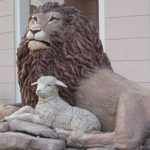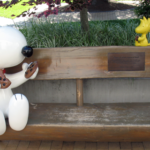I spent several days in the tropical rainforest of Costa Rica the week before Christmas. Although my visit seemed like a mini-vacation, the purpose was academic. I traveled to Costa Rica in preparation for taking Hardin-Simmons University students there in May for a course in tropical ecology.
This was my first visit to Costa Rica and the tropical rainforest, so this was a special trip for a biologist. Scientists like me—who teach about the high numbers of species of animals, plants and other organisms found in the tropics—are excited to visit such places.
This trip meant just as much or even more to me as a Christian than it did as a biologist. What biology reveals about God’s creation in terms of biodiversity provides Christians with an undeniable picture of the complexity and enormous number of species of creatures big and small that inhabit Earth with us.
 |
|
Rick L. Hammer
|
In Genesis, God said, “Let the waters bring forth swarms of living creatures, and let birds fly above the earth across the dome of the sky” (Genesis 1:20). The equivalent term today for swarms would be biodiversity or a plentitude of kinds of living organisms.
A 2011 scientific study estimated 8.7 million species live on Earth. About 6.5 million live on land, and 2.2 million live in the ocean. Scientists have been studying and naming species for 250 years. During that time, we have described and named only about 1.2 million of those 8.7 million species. The rest remain a mystery.
God’s creation is not doing well, and human action is a primary cause. We are losing biodiversity due to extinctions. Habitat loss, such as destruction of the rainforests, is a key factor. Species that never have been studied or named are being lost. Some could hold cures for human diseases, even cancer, but we never will have a chance to know about them. Ecologists also are starting to understand how the loss of species from ecosystems—such as forests, rivers, grasslands—can reduce nature’s ability to provide goods and services like food, clean water and a stable climate.
Should Christians care about the destruction of the rainforest or the endangerment or extinction of species? From Scripture, we know God has proclaimed his creation is good and therefore has value (Genesis 1). If the animals, plants and the totality of all living organisms—what we call biodiversity—have value to God, then humans should acknowledge their value as well.
As for me, if I value something, I generally try to take care of it. For example, my pickup truck, old as it is, is valuable to me. It takes me to work each day, takes me to church on Wednesday nights to help lead Royal Ambassadors, and to and from various Cub Scout activities. I value this vehicle, so I take actions and make decisions to protect and maintain it. I am a steward of my truck. To be honest, though, my truck has value to me only in terms of what it can do for me directly. Ethicists call this instrumental value. Apart from its instrumental value, my truck has no value in and of itself.
However, Genesis 1 reveals God’s creation—squirrels, oak trees, mushrooms, tropical forests, even deserts—have more than instrumental value, since God does not need these to benefit himself. From God’s perspective, the goodness of his creation then is intrinsic or internal. Bluebonnets, chinch bugs that damage your lawn (yes!), and all the yet-to-be discovered species have value simply because God created them and deemed them good.
Sign up for our weekly edition and get all our headlines in your inbox on Thursdays
As a result, God calls us to be stewards of Earth and its biodiversity. God gives humankind dominion over “all the wild animals of the earth and over every living thing that moves upon the earth” (Genesis 1:26-28). However, dominion does not mean domination, exploitation and misuse of God’s creation. In Genesis 2:15, we read, “The Lord God took the man and put him in the garden of Eden to till it and keep it.” As theologian Steven Bouma-Prediger states, “We are to serve and protect the garden that is creation—literally, to be slaves to the earth for its own good, as well as for our own benefit.”
This brings me back to Costa Rica. In May, my students and I will visit virgin tropical rainforests. They will learn about important species, take measurements of vegetation and soils, and learn how the tropical rainforest ecosystem works. But beyond learning about tropical ecology, I hope they will learn to understand and appreciate they are stewards of God’s creation, whether in Costa Rica or back home. At Hardin-Simmons, we call this “An Education Enlightened by Faith.”
Rick L. Hammer is an assistant professor of biology and environmental science at Hardin-Simmons University and a member of First Baptist Church in Abilene.














We seek to connect God’s story and God’s people around the world. To learn more about God’s story, click here.
Send comments and feedback to Eric Black, our editor. For comments to be published, please specify “letter to the editor.” Maximum length for publication is 300 words.